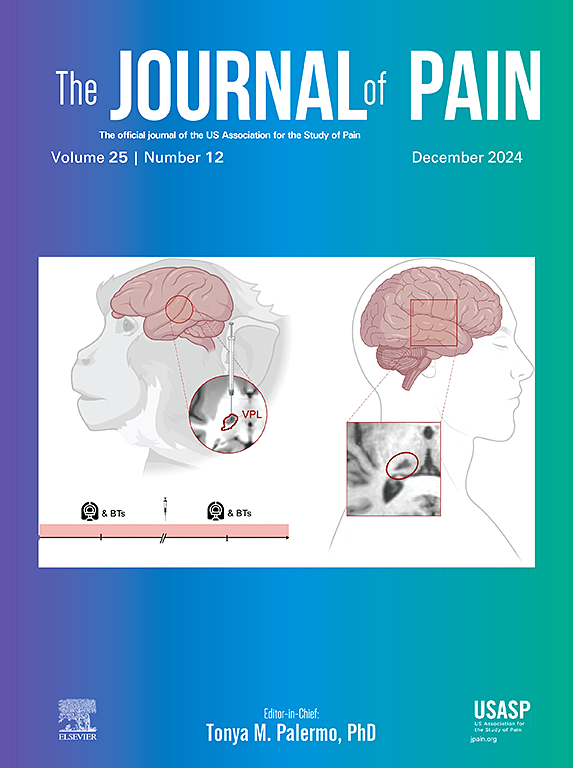利用性别刻板印象心理科学的见解,推进性别多样化个体疼痛体验的研究。
IF 4
2区 医学
Q1 CLINICAL NEUROLOGY
引用次数: 0
摘要
有证据表明,在疼痛体验和疼痛护理方面存在性别差异,以及刻板印象在延续歧视性护理中的作用,然而,这项工作的大部分集中在顺性别男性和女性之间的比较;人们对不同性别个体的疼痛经历和结果知之甚少。我们考虑扩展现有的以顺性别为中心的框架的价值,以了解性别刻板印象在临床护理中的应用如何导致疼痛护理差异,并使性别多样化的人经历的偏见、耻辱和歧视永久化。首先,我们回顾了刻板印象内容和刻板印象应用过程的相关文献,这些文献被认为有助于疼痛治疗中的性别歧视。然后,我们利用这个现有的框架,对跨性别男性、跨性别女性和非二元个体(以及出于复制和比较目的的顺性别男性和顺性别女性)的文化认可的与疼痛相关的刻板印象(即可信度、能力、精神疾病和情感戏剧化)进行了一项新的实证调查。我们发现,美国成年参与者样本(N = 221)一致认同与性别不同的人相比,性别不同的人对疼痛的负面文化刻板印象更多,这说明刻板印象的应用可能会破坏性别不同的人对高质量和公平的疼痛治疗。根据我们的研究结果,我们说明了这种刻板印象的应用如何在临床环境中表现出来。最后,我们整合了现有的社会心理学理论,以确定在临床疼痛遭遇中减少刻板印象影响的机会。观点:性别不同的个体经历疼痛护理差异,这在一定程度上可归因于文化刻板印象。在刻板印象理论和社会心理学研究的基础上,我们发现与疼痛相关的负面刻板印象适用于性别不同的个体,并强调了在临床互动中打断刻板印象应用以改善健康公平的机会。本文章由计算机程序翻译,如有差异,请以英文原文为准。
Leveraging insights from the psychological science of gender stereotyping to advance scholarship on gender-diverse individuals' pain experiences
There is evidence of gender disparities in pain experience and pain care as well as the role of stereotypes in perpetuating discriminatory care, however most of this work focuses on comparisons between cisgender men and women; little is known about gender-diverse individuals’ pain experiences and outcomes. We consider the value of extending existing cisgender-focused frameworks to understand how the application of gender stereotypes in clinical care contribute to pain care disparities and perpetuate bias, stigma, and discrimination experienced by gender-diverse people. First, we review the literature on stereotype content and stereotype application processes that are theorized to contribute to gender discrimination in pain treatment. We then leverage this extant framework to conduct a novel empirical investigation into the culturally endorsed pain-relevant stereotypes (i.e., trustworthiness, competence, mental illness, and emotional dramatization) of transgender men, transgender women, and nonbinary individuals (as well as cisgender men and cisgender women for replication and comparison purposes). We find that a sample of U.S. adult participants (N = 221) consistently endorsed more negative cultural stereotypes relevant to pain for gender-diverse than cisgender individuals illustrating how stereotype application may undermine high quality and equitable pain treatment of gender-diverse individuals. Based on our findings, we illustrate how this stereotype application may manifest in clinical contexts. Finally, we integrate existing social psychological theorizing to identify opportunities to decrease the impact of stereotypes in the clinical pain encounters.
Perspective
Gender-diverse individuals experience pain care disparities, which are in part attributable to cultural stereotypes. Building upon stereotyping theory and research from social psychology, we show that pain-relevant negative stereotypes are applied to gender-diverse individuals and highlight opportunities to interrupt stereotype application in clinical interactions to improve health equity.
求助全文
通过发布文献求助,成功后即可免费获取论文全文。
去求助
来源期刊

Journal of Pain
医学-临床神经学
CiteScore
6.30
自引率
7.50%
发文量
441
审稿时长
42 days
期刊介绍:
The Journal of Pain publishes original articles related to all aspects of pain, including clinical and basic research, patient care, education, and health policy. Articles selected for publication in the Journal are most commonly reports of original clinical research or reports of original basic research. In addition, invited critical reviews, including meta analyses of drugs for pain management, invited commentaries on reviews, and exceptional case studies are published in the Journal. The mission of the Journal is to improve the care of patients in pain by providing a forum for clinical researchers, basic scientists, clinicians, and other health professionals to publish original research.
 求助内容:
求助内容: 应助结果提醒方式:
应助结果提醒方式:


